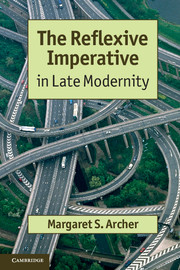Book contents
- Frontmatter
- Contents
- Figures
- Acknowledgements
- Introduction
- 1 A brief history of how reflexivity becomes imperative
- 2 The reflexive imperative versus habits and habitus
- 3 Reconceptualizing socialization as ‘relational reflexivity’
- 4 Communicative reflexivity and its decline
- 5 Autonomous reflexivity: the new spirit of social enterprise
- 6 Meta-reflexives: critics of market and state
- 7 Fractured reflexives: casualties of the reflexive imperative
- 8 Conclusion
- Methodological appendix
- Index
- References
7 - Fractured reflexives: casualties of the reflexive imperative
Published online by Cambridge University Press: 05 June 2012
- Frontmatter
- Contents
- Figures
- Acknowledgements
- Introduction
- 1 A brief history of how reflexivity becomes imperative
- 2 The reflexive imperative versus habits and habitus
- 3 Reconceptualizing socialization as ‘relational reflexivity’
- 4 Communicative reflexivity and its decline
- 5 Autonomous reflexivity: the new spirit of social enterprise
- 6 Meta-reflexives: critics of market and state
- 7 Fractured reflexives: casualties of the reflexive imperative
- 8 Conclusion
- Methodological appendix
- Index
- References
Summary
The rapid replacement of modernity's ‘situational logic of competition’ by the ‘situational logic of opportunity’ undoubtedly places more of a burden on subjects themselves, their familial relationships, natal relational contexts and their chosen social networks. This is because routinely competitive responses by groups, classes and associations are decreasingly appropriate for confronting novelty, as was maintained in Chapter 2. At the same time, ‘opportunity’ itself is met by a variety of responses. For some (the communicatives), it can be partly but not entirely evaded, for others (the autonomous), it can be seized upon and fallibly exploited, and for yet others (the meta-reflexives), it presents a new horizon of novel possibilities. However, not everyone can practise one of these three reflexive responses towards the ‘logic of opportunity’, all of which seek to match life outcomes to subjects’ life concerns. These are the fractured reflexives.
Whilst ‘opportunity’ represents the possibility of life being different for the ‘rejecters’, who have turned their backs on their natal backgrounds and the relational evils they represent, these subjects are regularly so preoccupied by the traumatic events in question that they focus on the immediate needs of survival. This precludes reflexive deliberation about more extended forms of purposeful action. Equally regularly, they admit to huge difficulties in making decisions, in defining courses of action to be consistently pursued and, above all, in engaging in anything more than the survivalist's day-to-day planning.
- Type
- Chapter
- Information
- The Reflexive Imperative in Late Modernity , pp. 249 - 291Publisher: Cambridge University PressPrint publication year: 2012



